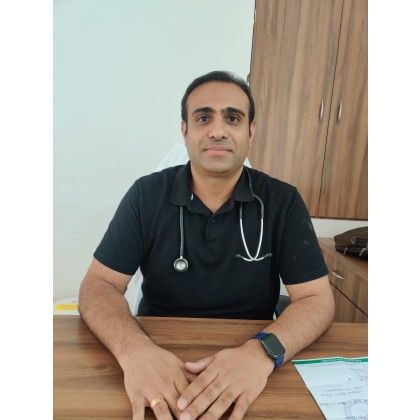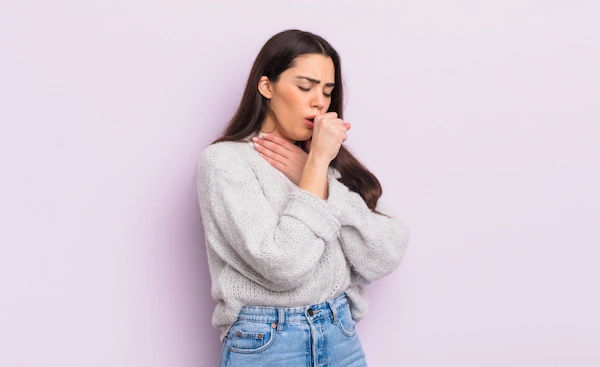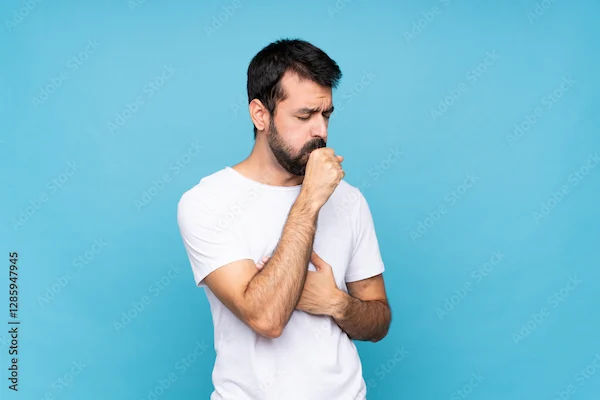How to Reduce a Cough in Kids?
Discover effective home remedies and natural treatments to reduce a cough in kids. Learn how to soothe their throat, boost immunity, and provide fast relief.

Written by Dr.Sonia Bhatt
Last updated on 3rd Jul, 2025
.webp?tr=q-80,f-webp,w-350,dpr-2,c-at_max 700w)
Coughing is a common symptom in children, often linked to colds or allergy flare-ups. While an occasional cough usually isn’t a reason to worry, a persistent or severe cough can be unsettling. Understanding its causes, recognising symptoms, and knowing the best treatment options can help parents manage their child’s cough effectively.
What is a Cough?
A cough is a natural reflex that clears the throat and airways, protecting the lungs from irritants like mucus, dust, and germs. In children, coughs can range from dry, non-productive ones to wet, mucus-producing types, each with different causes and treatments.
Types of cough includes:
Dry Cough: This non-productive cough doesn’t bring up mucus. It can be triggered by viral infections, allergies, or irritants.
Wet (Productive) Cough: This cough brings up mucus or phlegm, typically caused by a cold, flu, or other respiratory infections.
Barking Cough: Often sounds like a seal barking and can be a sign of croup, a common condition in younger children.
Wheezing Cough: A high-pitched wheezing sound during breathing, often a sign of asthma or a respiratory infection.
Common Causes of Cough in Children
Coughing can be triggered by several factors, including:
Viral Infections: Colds, flu, and respiratory infections like RSV (Respiratory Syncytial Virus) are common causes.
Allergies and Asthma: Pollen, pet dander, and dust mites can irritate the airways and lead to coughing.
Post-Nasal Drip: When mucus from the nose drips down the back of the throat, it can cause irritation and trigger coughing.
Environmental Irritants: Smoke, pollution, and strong fragrances can worsen coughing by irritating the airways.
Effective Home Remedies for Cough Relief
There are many simple, effective remedies to help your child feel more comfortable while they recover. Here's what you can try:
Hydration and Rest: Ensure your child drinks plenty of fluids like water, warm herbal teas, and broths. These help thin mucus and keep the throat soothed. Make sure they get enough rest to support their immune system.
1. Natural Soothing Remedies:
Some of the natural soothing remedies includes:
Honey (For children over 1 year): Honey is a well-known remedy that can soothe a cough and sore throat, especially at night. Studies have shown it works better than many over-the-counter syrups. (Don’t give honey to babies under 1 year old due to the risk of botulism.)
Warm Broths and Herbal Teas: Chicken soup and herbal teas like chamomile or ginger are soothing and help hydrate the throat.
Inhaling Steam: Steam helps loosen mucus and soothes irritated airways. You can place your child in a steamy bathroom or use a cool-mist humidifier in their room.
Saltwater Gargle: For children aged 4 and older, a saltwater gargle can ease throat irritation. Dissolve half a teaspoon of salt in warm water and have your child gargle and spit it out.
Elevating the Head: If coughing worsens at night, elevate the head of their bed with extra pillows to stop mucus from draining into the throat.
Saline Nasal Drops/Spray: These are safe for babies and young children and can help clear nasal congestion, which might be causing the cough.
Popsicles and Lozenges (For children over 4): Popsicles or lozenges can soothe a sore throat and promote hydration.
Humidifiers: A cool-mist humidifier can keep the air moist, helping your child breathe easier and reducing coughing caused by dry air.
Warm Compress: A warm compress on the chest can soothe discomfort and provide relief from a persistent cough.
Topical Rubs (e.g., Vicks VapoRub): Products containing menthol, camphor, and eucalyptus can ease coughing and clear the airways, making it easier for your child to breathe.
2. Extra Tips for Comfort
Extra tips for comfort includes:
Avoid Irritants: Keep your child away from smoke, strong smells, and pollution that can aggravate coughing.
Soft Foods: If swallowing hurts, offer soft foods like yogurt, mashed potatoes, or ice cream to avoid further irritation.
By combining these remedies with proper hydration, rest, and comfort, you can help your child recover more quickly and feel more comfortable.
When to Seek Medical Help and Recognising Serious Symptoms?
While most coughs in children are harmless, there are certain signs that should not be ignored. If your child shows any of the following symptoms, it’s important to consult a doctor:
High or Persistent Fever: A fever that doesn’t go away, especially if it’s unresponsive to medication, could indicate an infection that needs attention.
Difficulty Breathing or Wheezing: Laboured breathing, wheezing, or rapid breathing can point to conditions like asthma or other respiratory issues.
Fatigue or Loss of Appetite: If your child seems unusually tired or refuses to eat, this might suggest they are fighting an infection or dealing with a more serious illness.
Coughing Up Blood or Vomiting: Any instance of coughing up blood or vomiting along with a cough should be treated as an emergency and requires immediate medical attention.
Prolonged Coughing: If the cough lasts more than a few weeks or shows no improvement, it may be time to consult your paediatrician.
Whooping Cough: A persistent, uncontrollable cough with a "whooping" sound (often seen in whooping cough) requires medical evaluation.
By monitoring your child's symptoms closely and seeking doctor’s guidance when necessary, you can ensure their health and well-being are properly addressed.
Over-the-Counter (OTC) Treatments
For older children, OTC medications can help manage cough and cold symptoms. Just be sure to follow age-specific dosage guidelines:
Cough Syrups: Dextromethorphan suppresses coughing, while Guaifenesin (an expectorant) helps loosen mucus.
Decongestants: Phenylephrine can reduce nasal swelling, making it easier for your child to breathe.
Pain Relievers: Medications like acetaminophen or ibuprofen can reduce fever and ease throat pain.
Combination Products: Some OTC medications treat multiple symptoms, such as cough, sore throat, and congestion. Just be sure to check for overlapping ingredients.
Safety Tips for OTC Medications
Always follow the recommended dosage and age guidelines.
Be mindful of potential interactions with other medications.
OTC medicines are generally not recommended for children under 4 unless prescribed by a doctor.
Prescription Treatments and When They Are Necessary?
Most coughs in children are viral and won’t require antibiotics. However, if your child has a bacterial infection, antibiotics may be necessary. Other treatments may include:
Inhalers: For asthma-related coughs, inhalers can help open the airways.
Steroids: In more severe cases, steroids may be prescribed to reduce airway inflammation.
Preventing Coughs: Tips for a Healthier Child
Good Hygiene Practices: Encourage frequent handwashing and teach your child to cover their mouth when they cough or sneeze.
Vaccination and Seasonal Precautions: Make sure your child gets their flu vaccine and is up to date on other immunisations. During cold and flu season, limit exposure to crowded places and ensure they get enough rest.
Healthy Diet for Strong Immunity: Boost your child’s immune system with foods rich in Vitamin C (like citrus fruits and leafy greens) and Vitamin D (from milk, eggs, and sunlight).
Physical Activity and Fresh Air: Encourage outdoor play and regular exercise, even in colder weather, to support healthy respiratory function.
Parenting Tips for Managing Coughs
Observing and Monitoring Symptoms: Keep track of how often your child is coughing and note any other symptoms they may have. This information can be useful if you need to consult a doctor.
Seeking Professional Support: If you’re unsure about your child’s symptoms or if they seem to worsen, don’t hesitate to contact a paediatrician for guidance.
Conclusion
Coughing in children is usually harmless, but it’s important to stay on top of symptoms and seek medical advice if necessary. With the right home remedies and the knowledge of when to consult a doctor, you can help your child recover comfortably and quickly. By paying attention to their symptoms and following the right steps, most coughs will resolve with minimal fuss.
Consult Top Paediatrician
Consult Top Paediatrician

Dr Yaja Jebaying
Paediatric Gastroenterologist
9 Years • MBBS, MD PEDIATRICS, FELLOWSHIP PEDIATRIC GASTROENTEROLOGY AND HEPATOLOGY AND LIVER TRANSPLANTATION
Delhi
Apollo Hospitals Indraprastha, Delhi
(25+ Patients)

Dr. Viswateja Chitturi
Paediatrician
11 Years • MD, FNB(PICU). FNB Pediatric Critical Care- November 2020 Dr.Mehtas multi-specilaity hospitals pvt.limited, Chennai National Board of Examinations, New Delhi. M.D.(Pediatrics)-July 2016 NRI Medical College, Guntur, NTR University of Health Sciences, Vijayawada. MBBS - March 2011 GSL Medical College, Rajahmundry. NTR University of Health Sciences, Vijayawada.
Chinagadila
Apollo Hospitals Health City Unit, Chinagadila

Dr. Tharun C Varghese
Paediatrician
5 Years • MBBS, MD(Pediatrics)
Angamaly
Apollo Hospitals Karukutty, Angamaly
(50+ Patients)

Dr. Ravindranath S
Paediatrician
25 Years • MBBS, DCH
Bengaluru
S R Child and Family Health Care, Bengaluru

Dr. Dinesh Kumar Chandak
Paediatrician
10 Years • MBBS,MD PAEDIATRICS
Barasat
Diab-Eat-Ease, Barasat
(50+ Patients)

.webp)
.webp)

